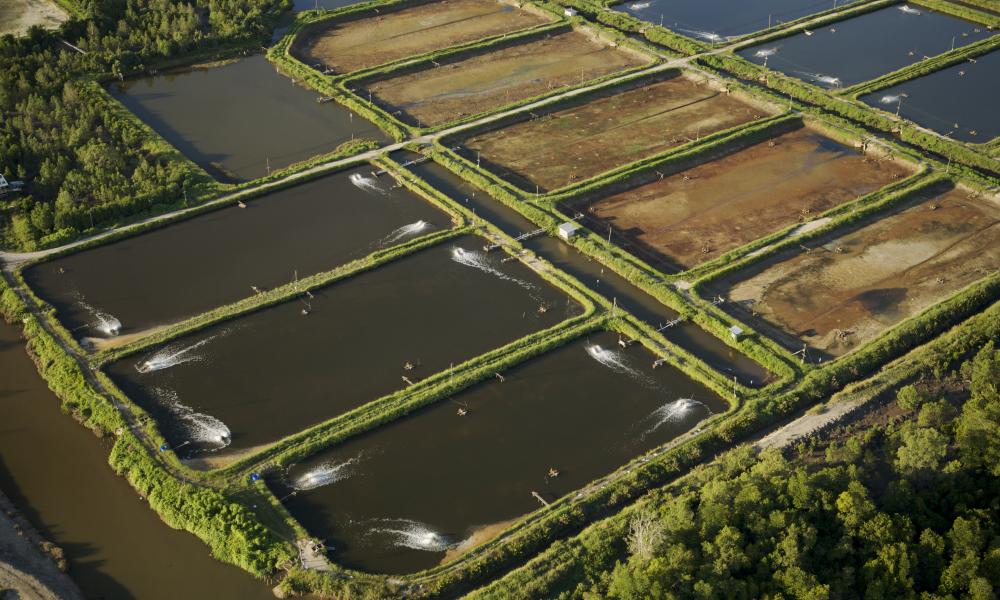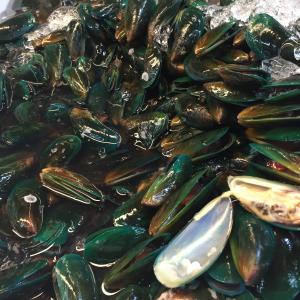
Why we work on Aquaculture
Why we work on Aquaculture
Aquaculture has been practiced for thousands of years and involves many species and farming methods. It is one of the fastest growing food-producing sectors in the world. If this growth continues, aquaculture will become as important as other food production like poultry, pork and even fishing!
When done responsibly, the impacts of aquaculture can be minimal, but when farms are poorly managed, aquaculture can have substantial impacts on the environment, climate and society. For example:
- Chemicals used can sometimes pollute the water.
- If farmed fish escape, they can negatively impact wild populations.
- Disease can spread from farmed to wild fish.
- Feed production can require wild-caught species that are an important food source to both marine predators and people, and soy can be linked to deforestation.
- Feed production can be linked to illegal, unreported and unregulated (IUU) fishing, and human welfare issues.
Certain kinds of aquaculture can even be regenerative for the ocean. Seaweed and shellfish aquaculture can improve ocean health and biodiversity by filtering water, providing habitat, and reducing acidity.
Creating a sustainable supply of seafood from aquaculture will only be possible if the social and environmental impacts from aquaculture are minimised. WWF is working to address these issues, to ensure seafood produced via aquaculture aligns with a future where people and nature can thrive.

How we work on Aquaculture - Aquafeed
How we work on Aquaculture - Aquafeed
Some aquaculture species (fish and crustaceans) need to be fed during production, with a nutritionally suitable feed (aquafeed).
In the past a large proportion of this feed was made up of fish meal and fish oil, sourced from wild caught fisheries, which put significant pressure on fish stocks and marine ecosystems.
Although aquafeed, particularly for salmon and trout, now contains much less fish meal and fish oil, having been replaced by more vegetable ingredients such as soy protein and rapeseed oil, these aquafeed ingredients still carry risks associated with deforestation, freshwater use, and greenhouse gas emissions.
Learn more about our work on Aquafeed.

How we work on Aquaculture - Regenerative seaweed farming
How we work on Aquaculture - Regenerative seaweed farming
Seaweeds are marine plants (algae) and are a natural part of marine ecosystems. For example, kelp forests support sea otters, seals, and seabirds. In many parts of Southeast Asia seaweed is farmed for use in foods like sushi. Here in the UK, we have a long tradition of wild harvesting of seaweed, which has gone into foods like laverbread in Wales.
Farming seaweed can be a regenerative food production method and a nature-based solution. Growing seaweed does not require land, feed, freshwater, fertiliser, or pesticides. This makes it a very low impact production method. Seaweed also has the added advantage of absorbing excess nutrients from the sea, such as nitrogen and phosphorus that runs from land into river and then into ocean. Seaweed farms can also temporarily remove carbon from the ocean, and displace carbon intensive products, helping us to combat climate change.
Seaweed and other aquatic plants have great potential to provide food for people, feed (e.g. protein) and nutrients (e.g. DHA, oil) for livestock, farmed fish and crustaceans. Seaweed could also one day be a substitute for synthetic fertilisers.
Around 30 million tonnes of seaweed is already produced globally, but there is potential to grow much more, and UK waters offer perfect conditions. Therefore, WWFs Seaweed Solutions programme is supporting seaweed farming in the UK.

Reducing synthetic fertiliser with seaweed
Reducing synthetic fertiliser with seaweed
In 2023, WWF received a grant from round two of Co-op UK and Co-op UK Foundation’s £3.5m Carbon Innovation Fund. The funding will allow us to explore if seaweed biostimulant can reduce the quantity of synthetic fertiliser required to grow crops, and bring down the carbon emissions of food production. Using seaweed sourced from UK seas on farms in Norfolk, this exciting project will take us a step closer to a regenerative agriculture where land and sea are connected in one system.

 Working on seafood: The Blue Food
Working on seafood: The Blue Food
 Learn More About Seafood
Learn More About Seafood
 Illegal, Unreported and Unregulated Fishing
Illegal, Unreported and Unregulated Fishing